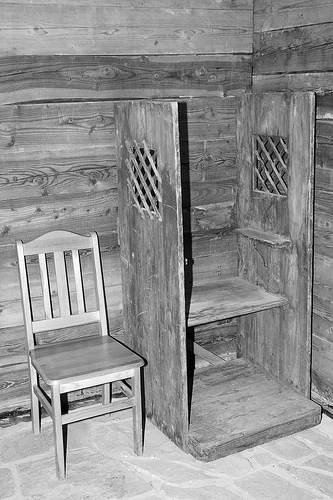
Confession is perhaps one of the most inexplicable elements of Catholicism for non-Catholics. The common view is, “Why should I confess to a priest instead of confessing directly to God?”
It’s not my intent to discuss whether or not confession is, as Protestants would press, strictly Biblical. In that end, I’ll mention only the basics: The Catholic Church bases confession primarily on two passages. The first is John 20:19-23:
On the evening of that first day of the week, when the disciples were together, with the doors locked for fear of the Jewish leaders, Jesus came and stood among them and said, “Peace be with you!” After he said this, he showed them his hands and side. The disciples were overjoyed when they saw the Lord.
Again Jesus said, “Peace be with you! As the Father has sent me, I am sending you.” And with that he breathed on them and said, “Receive the Holy Spirit. If you forgive anyone’s sins, their sins are forgiven; if you do not forgive them, they are not forgiven.”
The other is the renaming of Simon in Matthew 16:17-19:
Jesus replied, “Blessed are you, Simon son of Jonah, for this was not revealed to you by flesh and blood, but by my Father in heaven.And I tell you that you are Peter, and on this rock I will build my church, and the gates of Hades will not overcome it.I will give you the keys of the kingdom of heaven; whatever you bind on earth will be bound in heaven, and whatever you loose on earth will be loosed in heaven.”
One can argue about the interpretation of those passages, but even a cursory reading seems to indicate that the Catholic Church is on fairly solid ground, Scripturally speaking.
Still, I’m not interested in proving anything; I’m fascinated simply by the act. So many non-Catholics seem to find it appalling, but it seems to be a healthy way to deal with guilt — provided one is a believer. As I understand it, confession is not merely a matter of saying, “I’ve done this,” and the priest responding, “Now go do this.” If one is fortunate enough to get a good confessor, it seems like it would be more of a dialogue than a diatribe. One would not be going to confession over a matter one didn’t think was a character flaw. The act of confessing — truly confessing, and not just going through the motions — indicates that one wants to change, and discussing how to make those changes seems healthy.
It is, after all, what psychiatrists do.